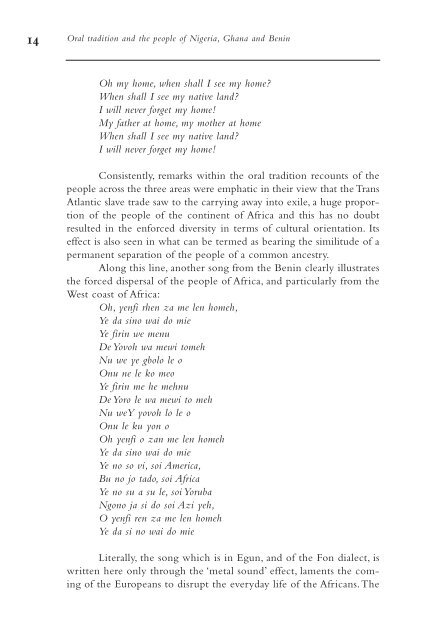Oral tradition relating to slavery and slave trade in Nigeria, Ghana ...
Oral tradition relating to slavery and slave trade in Nigeria, Ghana ...
Oral tradition relating to slavery and slave trade in Nigeria, Ghana ...
You also want an ePaper? Increase the reach of your titles
YUMPU automatically turns print PDFs into web optimized ePapers that Google loves.
14<br />
<strong>Oral</strong> <strong>tradition</strong> <strong>and</strong> the people of <strong>Nigeria</strong>, <strong>Ghana</strong> <strong>and</strong> Ben<strong>in</strong><br />
Oh my home, when shall I see my home?<br />
When shall I see my native l<strong>and</strong>?<br />
I will never forget my home!<br />
My father at home, my mother at home<br />
When shall I see my native l<strong>and</strong>?<br />
I will never forget my home!<br />
Consistently, remarks with<strong>in</strong> the oral <strong>tradition</strong> recounts of the<br />
people across the three areas were emphatic <strong>in</strong> their view that the Trans<br />
Atlantic <strong>slave</strong> <strong>trade</strong> saw <strong>to</strong> the carry<strong>in</strong>g away <strong>in</strong><strong>to</strong> exile, a huge proportion<br />
of the people of the cont<strong>in</strong>ent of Africa <strong>and</strong> this has no doubt<br />
resulted <strong>in</strong> the enforced diversity <strong>in</strong> terms of cultural orientation. Its<br />
effect is also seen <strong>in</strong> what can be termed as bear<strong>in</strong>g the similitude of a<br />
permanent separation of the people of a common ancestry.<br />
Along this l<strong>in</strong>e, another song from the Ben<strong>in</strong> clearly illustrates<br />
the forced dispersal of the people of Africa, <strong>and</strong> particularly from the<br />
West coast of Africa:<br />
Oh, yenfi rhen za me len homeh,<br />
Ye da s<strong>in</strong>o wai do mie<br />
Ye fir<strong>in</strong> we menu<br />
De Yovoh wa mewi <strong>to</strong>meh<br />
Nu we ye gbolo le o<br />
Onu ne le ko meo<br />
Ye fir<strong>in</strong> me he mehnu<br />
De Yoro le wa mewi <strong>to</strong> meh<br />
Nu weY yovoh lo le o<br />
Onu le ku yon o<br />
Oh yenfi o zan me len homeh<br />
Ye da s<strong>in</strong>o wai do mie<br />
Ye no so vi, soi America,<br />
Bu no jo tado, soi Africa<br />
Ye no su a su le, soi Yoruba<br />
Ngono ja si do soi Azi yeh,<br />
O yenfi ren za me len homeh<br />
Ye da si no wai do mie<br />
Literally, the song which is <strong>in</strong> Egun, <strong>and</strong> of the Fon dialect, is<br />
written here only through the ‘metal sound’ effect, laments the com<strong>in</strong>g<br />
of the Europeans <strong>to</strong> disrupt the everyday life of the Africans.The


